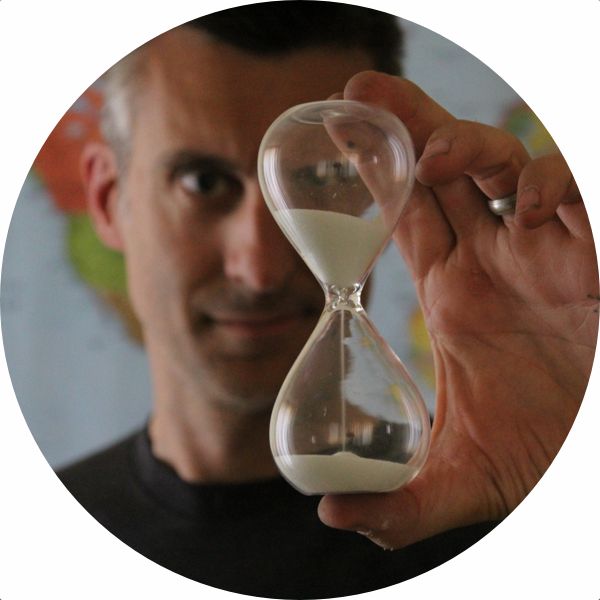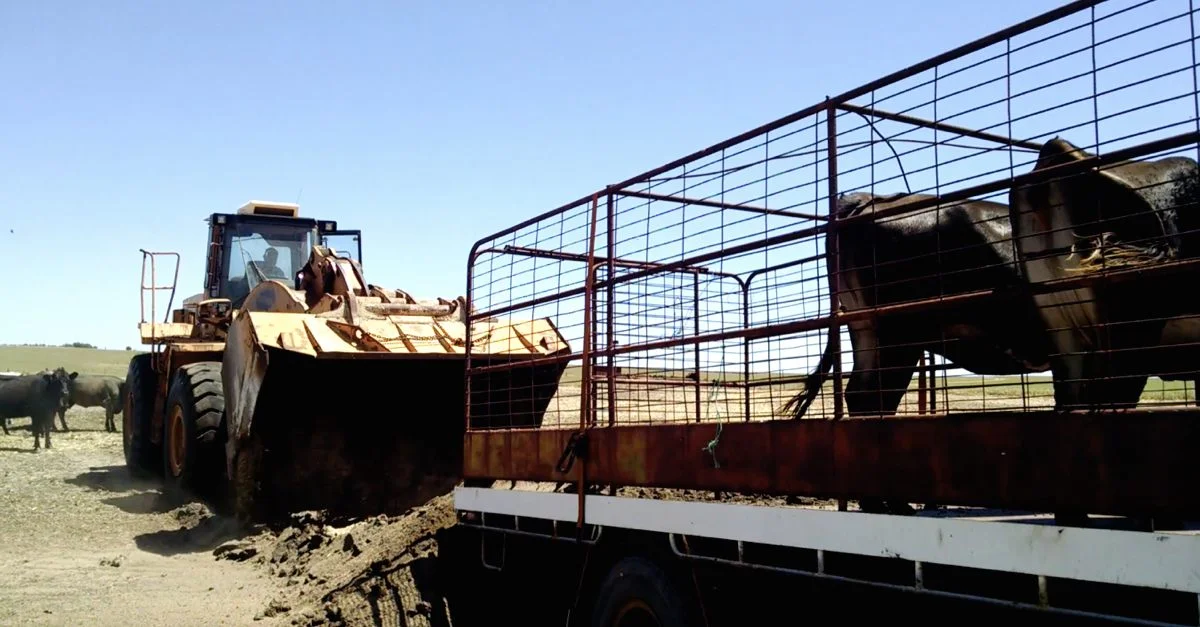17-10-2014 — 22-10-2014
Days 58 through 63: A Week in the Wheatbelt
WWOOFING IT
WWOOFing (Worldwide Opportunities on Organic Farms and/or Willing Workers on Organic Farms — depending which side of the equation you're on) is a program that pairs people who are willing to work on organic farms with farmers who are willing to exchange this labor in kind by providing the workers with meals and a place to sleep during their stay.
And that’s just what we did for seven days in the wheat belt of Western Australia.
Our Farm
The farm we worked on was a large one (by our standards, but still classified as a hobby farm by some) covering 1,800 acres. Many of the paddocks (fields) grow organic wheat, while other paddocks are grazing territory for 1,000 sheep. The fields were so long and wide, that sometimes we wouldn't see the sheep for days at a time.
Every morning, without fail, the roosters crowed. But they didn't crow at sunrise (which was about 5:30 a.m.) or at first light (about 4:30 a.m). No, these guys decided that 2:30 a.m. was a great time to have a crow-off. That's right, they didn't do it just once or twice — they kept at it five, six, or even seven times. So that was great.
I mentioned the flies on a previous post, but they're everywhere, so I'm going to talk about them again. These little devils show up in force about 8:00 in the morning, just as the temperature starts to climb, and remain pretty fierce until about 7:00 at night, when it's dark and starts to cool off.
The Meals
Our mornings started with breakfast about 7:00. There was, much to my dismay, no coffee. I'd spent many summers working on my grandparents' farm, and there was always coffee. It's where I started drinking coffee, in fact. So I spent the entire week with a low-grade caffeine-withdrawal headache. The breakfasts were cereal with homemade yogurt and fresh milk straight from the cow, sometimes warm, sometimes chilled.
On especially arduous days, we'd have tea about 10:00 a.m., but there was no actual tea, to Samantha's great disappointment (she also experienced a constant low-grade caffeine-withdrawal headache). Instead, tea meant a light snack. Lunch, which always happened at 12:00 Noon was a fairly simple meal, usually sandwiches and some kind of salad, though one day we had fried duck eggs. Dinner was typically at 6:30, and was much more of a Rockwellian affair, if Norman Rockwell ate Vegemite.
The Work
After breakfast, work began in earnest. There are all sorts of jobs to do on a farm. When we were there, the wheat harvest was just a few weeks off, so most of the jobs related to getting ready for that or catching up on those jobs that no one really likes to do, like cleaning equipment and picking rocks out of a 40-acre field. Samantha spent most of her time doing dishes, prepping for meals, sweeping, and vacuuming.
One of the daily jobs on the farm is taking care of the chooks (what we grew up calling chickens). This entailed collecting the eggs, and topping up their feed and water. Jackie really loved this job and couldn't wait to do it each day.
The sun sets at 6:30, and it sets fast in the flat land that makes up most of Western Australia. So after diner was eaten and the dishes were done, it was time to shower and retire to our small room on the side of the house to read and write in our journals before we drifted off to sleep.
That was the gist of our WWOOFing days, but the type of work and the general workload varied from day to day, and the weather was wildly unpredictable — hot and dry one day, chilly and damp the next.
Friday, 17-10-2014. Day 58.
High temperature: 28°C.
Frankie woke me up at 4:45 a.m. so she could see if it was time to milk the cow. (It wasn't). He didn't want to miss it, though, and I was only able to hold him off until 6:00 a.m. So we took a little stroll around the farm accompanied by the fierce buzzing of overhead electrical lines. No one else was up yet. We checked out the sheep and the small calf who was all by himself in a pen — little did he or I know there were big plans for him later that day.
Frankie got the chance to see the cow being milked at 6:30 a.m., which became the regular time for milking the week we were there. Every morning Frankie would wake at 6:00 a.m. and sit on the front porch until the farmer walked out to milk the cow (Rosie), then he'd join him. The first two days he just watched so the cow would get used to him being there, then he started to help out on the third.
Rosie and calf.
As we walked back from the milking we encountered a headless bunny on the porch, a welcome gift from the farm cat's hunting expedition the night before. By the time we'd finished breakfast, the cat had strewn rabbit entrails all over the porch. This did nothing to abate the number of flies around the place.
Bunny killer.
My second official job was to help hold the calf in place so the farmer could snap a little rubber band around his scrotum so his testicles would fall off. Right around the time this was going on, Jackie discovered that the pregnant ferret had babies that morning (all but one eventually died during our stay).
Mama ferret with babies.
After tea, our family drove the turbo-charged Holden Ranger to the recycling plant eight kilometers away. We had a fair amount of recycling to sort: two large containers overflowing with cans, paper, plastic, glass — all pretty routine stuff. On our drive back to the farm, we drove right past it and had to turn around on the highway. But this was the countryside of Western Australia, and there were no cars to be seen all the way to the horizon in either direction.
E-Waste collection at the recycling center.
During the afternoon, I helped to maintain some farm machinery, cleaned dried grass off a giant field mower (so it wouldn't get damp in the rain and rust the machine), and started a bunch of fires around the property. This was a controlled burn, a pre-emptive strike against potential wildfires during the hot, dry months of summer. If there's no fuel, there's nothing for the fire to burn.
Fire on the farm.
As I set the fires, the farmer drove around in a flatbed pick-up with a giant water reservoir on the back, spraying areas to slow the burn and putting out any fires that went where they weren't wanted. It went very smoothly, and the whole process took about three hours. There was more to burn, but it was time for dinner and the sun was going down — we'd have to finish the job in the morning.
At one point as we were standing around watching the grass to burn, Frankie picked up one of the chooks, a brown hen, and promptly named her Dina.
Saturday, 18-10-2014. Day 59.
High temperature: 22°C.
Not only did we awaken to the standard sound of macho roosters, but we were treated to a heavy drumming on the roof as the rain started coming down hard at 4:00 a.m.
Although it stopped by breakfast, that still meant we couldn't do phase two of the controlled burn. Instead, I helped hang wire at the orchard that will serve as the frame for shade cloth (to keep the birds from eating all the fruit). Doing any amount of work is really hard when you have to keep the flies out of your nose, but we got it done.
While I was coiling and uncoiling lengths of wire cable, Samantha helped plant beans (at the new trellis I'd put up the day before) and other garden vegetables while the kids made rainbow loom bracelets to put on the chooks' legs so they could tell them apart.
In the evening we went on a tour of the farm, and we met the guard alpacas. These four critters (three of which are pictured below) roam and graze with the sheep, keeping them safe from foxes. Sounds far-fetched, but apparently alpacas (notoriously bad-tempered) will fight off foxes. Who knew?
The three alpacas.
1,800 acres is a lot of land, although not all of it is arable. Part of the property is Australian bush, which was pretty cool to see.
Australian bush at twilight.
We saw (and chased) two western gray kangaroos that were in one of the paddocks (they do more damage to the wheat by jumping on it than eating it) and also came across a goat that escaped a few weeks back. She had two kids with her, and she watched us approach until we got too close for her liking, then she hopped over the fence and was gone again.
Western gray kangaroo on the run through the wheat paddock.
As we drove around, lightning strikes flashed on the horizon — a big storm was coming our way. We got back just before the rain started to fall, and it was really coming down.
Sunday, 19-10-2014. Day 60.
High temperature: 17°C.
Sunday is a day of rest on the farm, and it rained on and off all day long. As a result, the day was relatively relaxing, if a bit dreary and cold (which was weird, because it had been so hot and bright the past three days).
The most notable thing that happened was Frankie found a baby magpie that had fallen from a tree and built a little nest for it in a stump. But the bird kept leaving the nest, and the kids kept putting it back. We finally had to tell the kids to let it be. One of the kids found it in the shed, dead, a few days later.
This is a magpie. But it's an adult.
Monday, 20-10-2014. Day 61.
Nice temperature: 23°C.
Today, our job was picking rocks out of something like half of a 40-acre field. This consisted of me slowly driving a tractor with a front-end bucket along the field as the kids picked up any rock bigger than an adult human fist. There was no shade, and it took us three sessions (a total of five hours) to clear our corner of the field.
One of nine buckets of rocks that we picked out of a field.
Two of the farmer's kids have both been coughing violently since we arrived, and today, after a visit to the doctor, we learned the daughter had pneumonia. It wasn't known if it was the contagious type or not (and we never found out about the pneumonia).
We also learned that there was an outbreak of whooping cough in the nearby town where the kids go to school. This made us think about cutting this part of our adventure short. Getting sick is almost a certainty on this trip, but this felt like inviting trouble. We ended up sticking it out, but we jumped nervously every time someone coughed, which was frequently. Good thing we are all well-vaccinated.
Spoiler: Even though we were vaccinated against whooping cough, this was a different strain here in Western Australia. And Samantha ended up contracting what is known as the “100 Day Cough.” An apt name, because that’s how long she had it.
Tuesday, 21-10-2014. Day 62.
High Temperature: 28°C.
Turns out that the field we’d picked rocks out of had another whole section that needed to be cleared. So after breakfast, we went back at it. Jackie wasn't into it this time, so we left her in our small room to do some homework while Samantha, Frankie, and I cleared the rest of the field of fist-sized and bigger rocks.
I spent many hours operating this machine.
Some of the rocks were pretty big, and on two occasions, when we flipped over these larger rocks, we found a redback spider, which looks a lot like a black widow and is just as venomous. Fortunately, no one was bitten. Also fortunately, we avoided seeing any of Australia's venomous snakes.
One of two redback spiders we discovered.
But when the days were all over, that field was certified rock-free, except for a few giant boulders on the east end of the paddock. A job well done, if we say so ourselves (and we do).
This is a rock pile. There are many like it. But this one is ours.
Wednesday, 22-10-2014. Day 63.
High temperature: 34°C.
We didn't really have a lot of work to do anymore, so the kids and I were given the job of washing the farm truck. There was a strong wind blowing across the flat fields, which dried off the newly washed truck in a jiffy.
After the truck was suitably clean, I helped corral two cows and load them onto a flatbed truck. How do you entice cows to get into a flat bed truck for transport? With a handful of grain, of course!
Cows on a truck.
We then drove down a series of dirt roads, transporting the cows to a nearby farm to drop them off in a paddock with a herd of other cows (and one lucky bull) for breeding purposes.
So ... now that the cows were on the flatbed, how does one get them off? Simple! You use a front end loader to build a dirt ramp they can walk down.
Heavy duty farming: how it's done in the WA.
We left the cows to their holiday and made the drive back to the farm, We did such a good job washing the farm truck that we were asked to wash the family car, too, and we got it done just before the dinner bell.
This was the last day on the farm, and while we enjoyed the experience (except for that bit with the rocks) we were definitely looking forward to getting back to Perth.
A Western Australia country road.
Notable Statistics
Hours in a tractor: 9
Crowing roosters: 3
Number of rooster crows heard: a lot
Frequency of crowing: nearly constant
Flies (inadvertently) eaten: 5
Cars washed: 2
Calves gelded: 1
Rocks picked: too many
Header image: An organic wheat field in Western Australia.

Tom Fassbender is a writer of things with a strong adventurous streak. When not adventuring, he’s been known to enjoy a cup of coffee or two. You can find him at Facebook and Instagram.
This post may include affiliate links which helps to support this site. As an Amazon Associate, we earn commission from qualifying purchases at no extra cost to you.



































